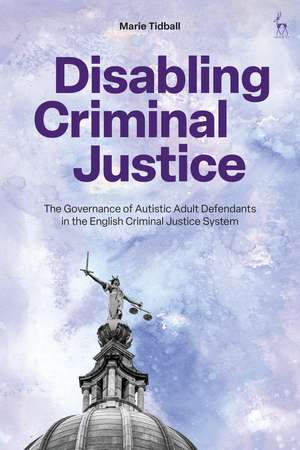Disabling Criminal Justice: The Governance of Autistic Adult Defendants in the English Criminal Justice System
Autor Marie Tidballen Limba Engleză Hardback – 6 mar 2024
Preț: 511.81 lei
Preț vechi: 732.03 lei
-30% Nou
Puncte Express: 768
Preț estimativ în valută:
97.94€ • 106.81$ • 82.58£
97.94€ • 106.81$ • 82.58£
Carte tipărită la comandă
Livrare economică 24 aprilie-08 mai
Preluare comenzi: 021 569.72.76
Specificații
ISBN-13: 9781509956944
ISBN-10: 1509956948
Pagini: 336
Dimensiuni: 156 x 234 x 24 mm
Greutate: 0.58 kg
Editura: Bloomsbury Publishing
Colecția Hart Publishing
Locul publicării:London, United Kingdom
ISBN-10: 1509956948
Pagini: 336
Dimensiuni: 156 x 234 x 24 mm
Greutate: 0.58 kg
Editura: Bloomsbury Publishing
Colecția Hart Publishing
Locul publicării:London, United Kingdom
Caracteristici
Makes a timely intervention, reflecting on criminal justice policy-making in the decade following the Equality Act 2010 and the Autism Act 2009
Notă biografică
Marie Tidball is Founding Director and Coordinator of the Oxford University Disability Law and Policy Project, UK. She is also Research Associate at Wadham College and the Bonavero Institute of Human Rights, UK.
Cuprins
1. Introduction: Autism, Criminality and the Criminal Justice System2. Qualitative Methods and Inclusive Research ParticipationPart 1: How Should Adult Defendants with Autism be Governed? 3. Disabling Criminal Justice: Developing a Theoretical ToolkitPart 2: Strategies of Governance: Adult Defendants with Autism and the Policy Context4. Disability vs Vulnerability in Liaison and Diversion5. Where's Criminal Justice? The Autism Act 2009 and Related PolicyPart 3: Technologies of Governance: Criminal Court Practice 6: Pre-trial Shaping: The Police, the Crown Prosecution Service and Decision to Prosecute7. To What Ends Are They Governed? Negotiating the Courtroom, Remand and Plea8. Dividing Practices in Case Disposal: Aggravating and Mitigating Factors, Conviction and Sentence9. Governance through the Family: Collateral Impact and 'Symbiotic Harm' for Defendants' FamiliesPart 4: 'The Creation of Other Possible Ways of Living'10. Conclusion: The Normative Case for Disabling Criminal Justice
